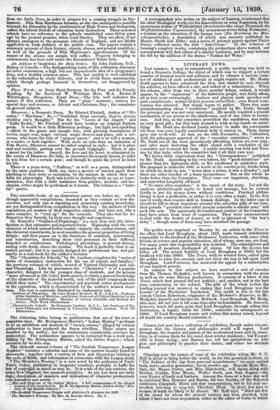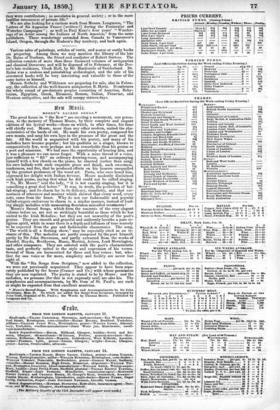LITERARY NEWS.
Last summer, it may be remembered, a public meeting was held to found a Dramatic College, the object of which was to support a certain number of decayed actors and actresses, and to educate a certain num- ber of children of such professionals as might require aid. Mr. Henry Dodd appears to have conceived the idea, and started it, and, through his solicitor, to have offered a site, and talked of a subscription. When the scheme' after from two to three months' delays, caused, it would appear, by the "supineness" of the histrionic people, was fairly afloat, all at first went swimmingly. Authors and players made speeches and paid compliments ; matter-of-fact persons subscribed ; even Royal coun- tenance was obtained. But clouds began to gather. There was some misunderstanding about " conditions " required by Mr. Dodd ; though the principal one was not very unnatural. He merely required a present nomination of one person to the almshouses, and of one other in succes- sion. And this, as the committee prescribed the candidates was really no very great gift ; but that body seemed to wish to lay hands on every- thing. Mr. Dodd also declined (under advice) to make the conveyance till there was some legally constituted body to convey to. These causes gave rise to ill will. At last, on the 16th November, Mr. Cullenford, with the subsequent approval of the "executive committee," wrote to Mr. Dodd one of the most gratuitously affronting letters we ever read ; and after more bickering the :affair closed with a resolution of the committee not to accept his land. A public meeting was held last Tues- day by that body, when the committee had it all their own way.
We derive these impressions from the " Correspondence " published by Mr. Dodd. According to his own letters, his "good intentions" are greater than his diplomatic skill, or tis excellence in epistolary style. His proposal to subscribe 100/. in bricks at the market price, bricks being an article he deals in, was "worse than a crime, it was a blunder"; and there are other touches of a fussy inexperience. But on the whole he looks better than the Committee. They come out impatient, clutching, and somewhat haughtily off-hand. Ne autos Ultra crepidami" is the moral of the story. Let not the amateur philanthropist aspire to found and manage, but be content kindly to put his money down without conditions.' Practical philan'- thropy is now a profession, or rather it is very often a trade.' In the first case it really does require skill in human dealings. In the latter case it should be lat to those ingenious persons who advertise gifts of one hun- dred pounds "provided nine other persons subscribe a similar sum," and such like arts. The apparently ill-conditioned conduct of the Committee ay have arisen from want of experience. They were unaccustomed to deal with the doubts of donors, as well as ignorant of "the law's delay " ; though some of them may have mouthed the passage.
The public., were surprised on Monday by an article in the Times to the effect that Lord Brougham, about 1823, made himself indefinitely responsible to the landlord of the Mechanics' Institution, with some other friends of science and popular education, all of whom, save one, are dead. For many years this responsibility was nominal. The subscriptions and payments of members discharged all claims. Of late the income has fallen off. The actual liability of Lord Brougham is 3:5001. but the landlord will take 2000/. The Times, with its wonted force, called upon the public to raise this amount, and not allow the loss to fall upon Lord Brougham. Lord Fortescue has answered the appeal by a subscription of one hundred pounds. In relation to this subject we have received a sort of circular from Mr. Thomas Hodgskin, well known in connection with the press as well as for some literary productions. It consists of a letter to the Times, which that journal did not publish ; and another, not in the best tone, commenting on the refusal. The pith of the whole is that the leading jourual was incorrect in stating that Lord Brougham was the founder of the Mechanics' Institution. The credit is due to the late Joseph Clinton Robertson, originator of the _Mechanic's Magazine, to Mr. Hodgslrin himself, and the late Dr. Birkbeek. Lord Brougham, Mr. Hodg: skin says, did not join it till some time after its foundation. He does not, however, touch the main point that Lord Brougham, through aiding this Institution' is legally liable for 3600/., reducible by arrangement to 2000/. If Lord Brougham wants and wishes this money raised, beyond all doubt the country should subscribe it.
Cannes just now has a collection of celebrities, though under circum- stances that the literary and philosophic world will regret. Lord Brougham, the founder and patron of the modernized town and its amen- ities, is of course there for his usual dead-winter residence ; but Tacque- vine is there dying ; and Bunsen has left his speculations on reli gion and philosophy to practice their duties, and solace his stricken friend.
Glancing over the names of some of the celebrities whom Mr.' S. C. Hall is about to bring before the world, in his two promised lectures on "The Authors of the Age from personal acquaintance," we seem carried back, not to another generation, but to another age. Hannah More, Mrs. Opie, the Misses Porter, and Miss Edgeworth, will figure along with Bowles, Crabbe, Tom Moore, Walter Scott, and Sam Rogers,—the very Nestor of bards and bankers. Among the lions of a later day will be exhibited Mrs. Hemans and Banim, the two Smiths, of the Rejected Addresses, Campbell, Hood, and that unscrupulous, but in his way un- rivalled, wit-wag or wag-wit, Theodore Hook. In short, few men or women of mark arc likely to be absent. Mr. Hall says, "there are few Of the many by whom the present century has been glorified, with whom I have not been acquainted, either as the editor of works to which they were contributors ; as associates in general society ; or in the more familiar intercourse of private life." We are also looking for a curious work from Messrs. Longmans, "The Letters of Sir Augustus Frazer [written?] during the Peninsular and Waterloo Campaigns" ; as well as Paul Kane's four years' "Wander- ings of an Artist among the Indians of North America," from the same publishers. These wanderings extended from Canada to Vancouver's Island, Oregon, through the Hudson's Bay territory, and back again.
Various sales of paintings, articles of verta, and scarce or costly books are preparing. Among them we may mention the library of the late Dr. Raine of Durham, the friend and coadjutor of Robert Surtees. The collection consists of more than three thousand volumes of antiquarian and classical literature, and will be disposed of in February, at the Doc- tor's late residence, Crook Hall, by Mr. Hardcastle of Sunderland. Dr. Raine was a zealous and painstaking archreologist, and the sale of his annotated books will be very interesting and valuable to those of the same tastes as himself.
Messrs. Sotheby and Wilkinson are preparing for sale, also in Febru- ary, the collection of the well-known antiquarian B. Hertz. It embraces the whole round of pre-historic peoples consisting of Assyrian, Baby- lonian, Egyptian, Greek, Etruscan, Roman, Indian, Peruvian, and Mexican antiquities, and the sale will occupy sixteen days.



























 Previous page
Previous page